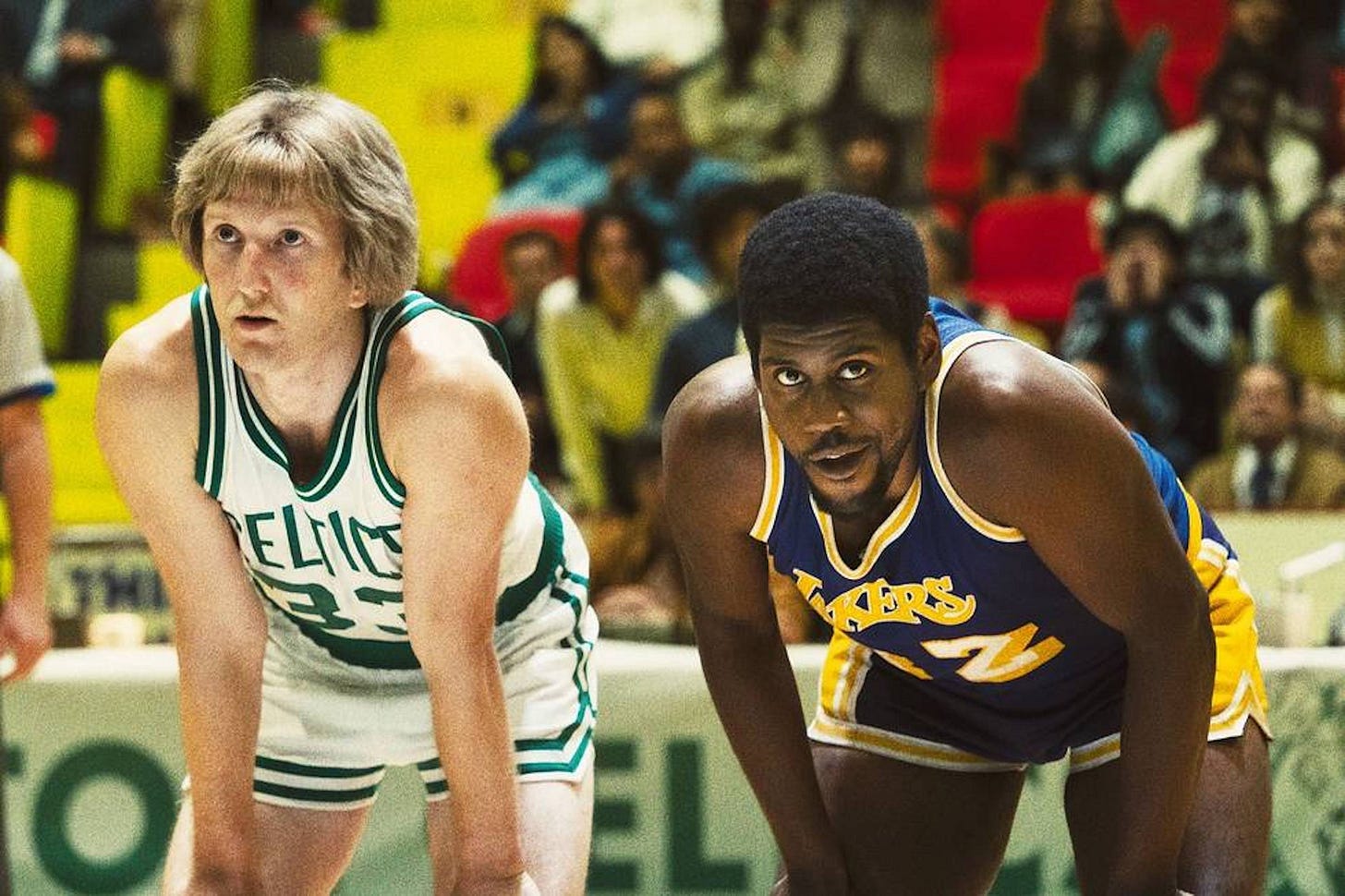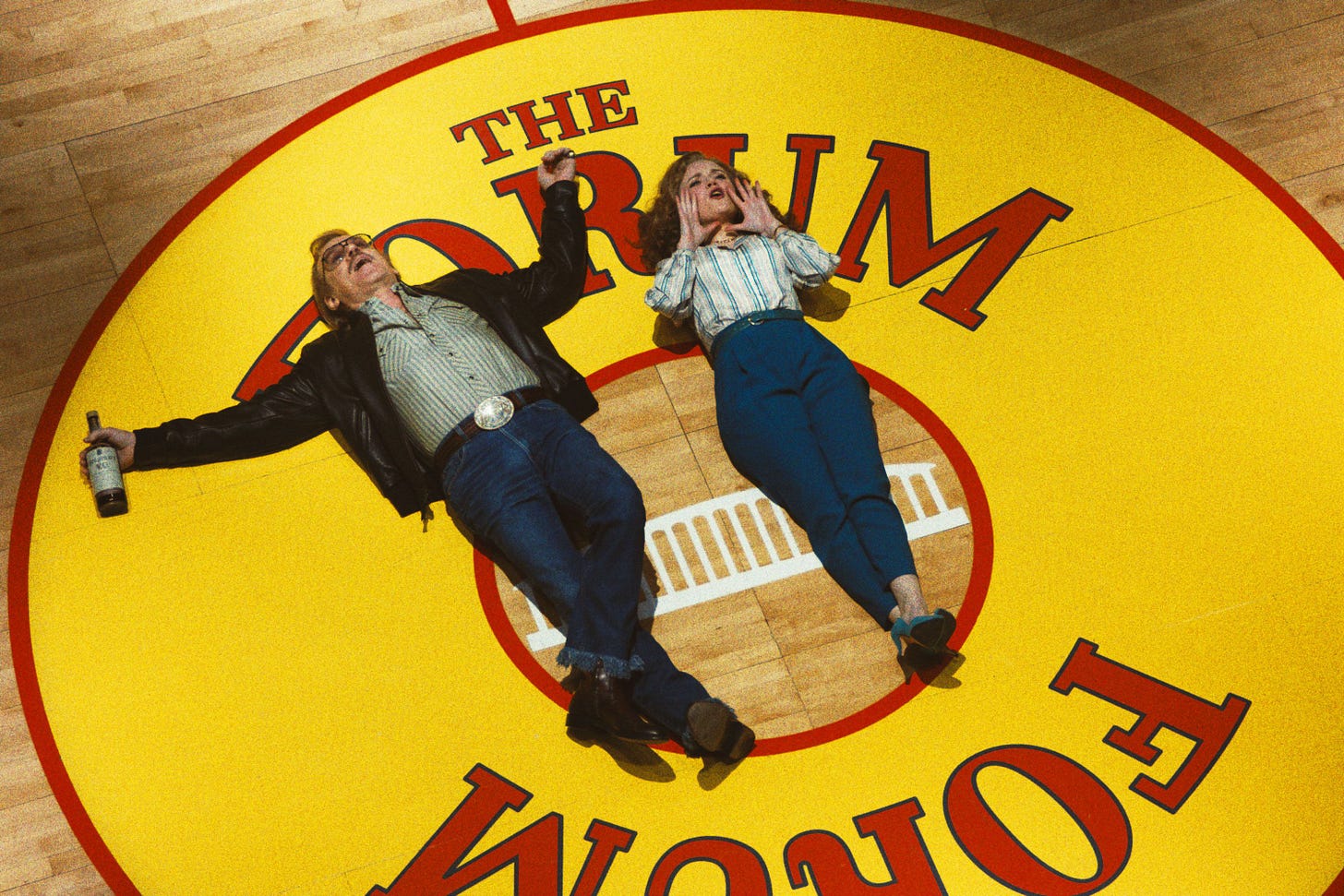So long, Winning Time.
The HBO drama, chronicling the Los Angeles Lakers during their Showtime Era was cancelled Sunday, after just two seasons.

Winning Time: The Rise of the Lakers Dynasty was abruptly cancelled by HBO earlier this week.
I do mean that literally.
When the news started circulating online late Sunday night, the show’s second season (and ultimately, it seems, series) finale was still airing.
Brutal.
Now, hey, what are you going to do? That’s show business, as the cliché adage goes. And these decisions are never made in a vacuum either, of course.
One of the Winning Time’s producers, Kevin Messick, in an interview with Vulture that ran not long after the decision became public, revealed that the show’s creative team was given advance warning of a potential cancellation during production.
It allowed them to add a series of post-scripts following the final episode, giving a brief summary of the stories they’ll never be able to tell.
But in a way, such an unceremonious ending kind of encapsulates the uphill battle the show had been fighting since the very beginning, even as, over seventeen episodes, it became one of the most narratively and visually creative endeavours on television.
Based on Jeff Pearlman’s book, Showtime: Magic, Kareem, Riley, and the Los Angeles Lakers Dynasty of the 1980s, the show worked to capture one of the most influential and important eras in NBA history, while still inching towards something bigger.
Despite being, according to many who were there, a questionable, at best, fictionalization of what actually happened (we’ll get to that).
Regardless, Winning Time was only just beginning to lay the long-term building blocks that now, with its untimely cancellation, we won’t see resolved on screen, unless the show is picked up by another network/streaming service.
And given the current state of the entertainment world: the ongoing labour dispute, rising creative costs and the continued slashing/removing of content wholesale, that possibility, if not impossible, seems unlikely.
It was a helluva ride though.
In 1979, Dr. Jerry Buss (John C. Reilly) the high-flying business magnate, purchases the Los Angeles Lakers.
While the recouping of his investment is always front of mind, Buss is determined to turn the team not just into a winner but an enterprise, the standard for which all other NBA teams will be measured against.
In order to do that though, he’ll need to navigate front office politics by way of player-turned-coach and later executive Jerry West (Jason Clarke), the lynchpin keeping everyone in check, Claire Rothman (Gaby Hoffmann) and a revolving door of coaches, most notably, Jason Segel’s Paul Westhead and Adrien Brody’s Pat Riley.
All the while, Buss tries tires to cultivate stronger relationships with his adult children, specifically his daughter Jeanie Buss (Hadley Robinson) who quickly proves, with Rothman’s mentoring, to be her father’s heir apparent.
And on the court?
The Lakers, primarily led by Kareem Abdul-Jabbar (Solomon Hughes), Norm Nixon (DeVaughn Nixon, Nixon’s real-life son) and Magic Johnson (Quincy Isaiah), revolutionize the game with their up-tempo, fast break-driven (and championship-winning) style of play, later dubbed “Showtime”.
Add in:
LA’s long-standing blood feud with Red Auerbach’s (Michael Chiklis) Boston Celtics, later to feature Magic’s greatest on-court rival, Larry Bird (Sean Patrick Small).
The complex personal lives of the various Lakers, Abdul-Jabbar and Johnson specifically, who must learn to adjust not only to their rapidly growing fame but their contrasting personalities/leadership differences as well, which are often a source of tension.
Riley’s arc: he retires as a long-time role player and eventually works his way up to the top-coaching gig, a prelude to one of the most accomplished executive careers in basketball history.
You have yourself a show.
And what a show it is.
Episodes frequently have characters breaking the fourth wall and speaking directly to the camera either to provide exposition or, as is often the case with Clarke’s West, to emphatically (and hilariously) curse somebody out.
The cinematography, soundtrack, basketball choreography and costuming are all top-notch, working in tandem, to bring, to vivid life, a specific place and time.
Whether it is the experimentation with various presentation styles, from emulating the washed-out film grain look of the period, the self-deprecating explanatory text or, in what is again, probably the production’s best work, the on-court segments.
They expertly recreate famous in-game moments down to the smallest detail, with (almost) perfect accuracy while not sacrificing either viewing clarity or pure entertainment value, a balance that sports docudramas of similar intent always seem to struggle with.
It is incredibly impressive.
So too, is the work of Winning Time’s ensemble cast.

At times, it almost feels like Winning Time has five different protagonists, depending on the larger arc being told or the story any particular episode choses to focus on. And with only so much screen time to go around, there is occasionally, in the second season especially, a sense of characters en masse being shortchanged.
But when it shines, it is prestige television at its very best.
John C. Reilly’s Buss walks a delicate line between being someone who is obsessed with winning on the court but struggles to match that same level of commitment in his personal life.
He is played as a hard-living womanizer, trying to keep everything above board (particularity in his relationships with daughter Jeanie and Johnson, who becomes something of a surrogate son) but never feels purposefully unsympathetic.
It is some of the best work of Reilly’s career.
Quincy Isaiah, as Magic Johnson, on the same hand, is tremendous in his breakout role. To the cameras and often to his teammates too, he is, well, Magic, starting as the easy-going, always-confident rookie with almost supernatural talent who will quickly became one of the most acclaimed players in baseball history.
But in his quieter moments, he is just Earvin, struggling with self-doubt and uncertainty. Isaiah plays both sides perfectly, the show at large, not pulling any punches either.
Johnson is often shown to be drowning his worries in a never-ending stream of sex and casual hookups, to the determinant of his relationship with on-and-off girlfriend and later fiancé Cookie Kelly (Tamera Tomakili) and as history tells us, his personal health as well (the pilot episode opens with Johnson receiving his HIV diagnosis in 1991).
As Kareem Abdul-Jabbar, Solomon Hughes isn’t given as much, in terms of sheer content to work with but he still strikes a great balance.
By the time Johnson arrives in 1979, Abdul-Jabbar is already a legend, a trendsetter and an icon in the sport. He openly struggles to adapt to both a new player and system that are polar opposites to his personal and on-court style.
Hughes can be abrasive and almost cold but he also shows Abdul-Jabbar’s softer side, as he realizes the importance of becoming not just a more diverse player but a stronger mentor and multi-faceted leader too. It is a fantastic performance.
And everyone else?
From Brody’s Pat Riley, Clarke’s Jerry West and Robinson’s Jeanie, to Patrick Small’s Larry Bird, who despite, not being the main focus, still manages to humanize the man, with his tragic past but bring full credence to the myth: the insane competitor, the win-at-all-costs player who would accept nothing but the best from himself and teammates alike.
They’re all excellently cast and wonderfully played but too often, their work in totality is overshadowed by something nobody can escape on Winning Time: the show’s structure.

The show’s first season, of ten episodes, focuses exclusively on the Lakers 1979/1980 season.
As, with a new owner in Buss and unproven rookie in Johnson, they’re beset with doubts and critics, many from inside the team itself. And it doesn’t come without hardship but they eventually silence them all, beating Philadelphia in six games to win the NBA Championship.
Season two? It condenses four seasons, 1980 through 1984, into just seven episodes, while still trying to accomplish everything else: the personal drama, the set-up for future storylines and the actual basketball.
It was, frankly, too much, too soon.
Was it a creative decision? An HBO-mandated move? A casualty of Hollywood’s ongoing labour dispute? Maybe something of all three, even if it would’ve been ridiculous to expect to see all of the “Showtime” era, leading to Johnson’s initial retirement in 1991, over eleven or twelve individual seasons.
But the way the show ended on Sunday, those little post-scripts be dammed, with the Lakers despondent after losing the ‘84 Finals to the Celtics?
It felt like something was cut in editing, like production wanted to squeeze in an additional episode or two: the ‘85 season, when the Lakers finally beat Boston in the Finals, or to further show the evolution of Bird and Johnson’s relationship, as they would eventually move beyond their rivalry and become close friends.
Instead, it seems like they ran out of the time, funding or creative steam.
It didn’t help that the show seemed to openly prioritize certain storylines over others, which meant that characters like Rothman or Jeanie are often sidelined for long stretches. And considering they were the two most prominent female voices, this is all the more frustrating.
So too, is this fact that show ran during the dog days of summer, far removed from the NBA season, when additional eyes from a more naturally invested audience, could’ve helped by maintaining a stronger and more consistent viewership.
Heck, they couldn’t even title the show “Showtime”, HBO, not wanting casual viewers to get confused with the competing television network of that name.
Like… c’mon.
Winning Time was not well received by the people it was fictionalizing.
Jerry West, in particular, was furious.
Jason Clarke’s portrayal depicts him as a borderline alcoholic, a man who, driven by rage and an unquenchable thirst for victory, is forever teetering on the edge of some emotional implosion.
During the airing of the first season last year, West demanded an apology from HBO, later threatening to sue the network and take them, “all the way to the Supreme Court”, per the Los Angeles Times, feeling that he was portrayed in a purposely deeming and disrespectful light.
Magic Johnson publicly denounced it, claiming that, without the players themselves being involved creatively, it wasn’t worth it.
And Kareem Abdul-Jabbar did the same, who found the characters to be nothing but caricatures and the show itself, boring:
“It never held my interest enough for me to care, let alone be outraged.”
Listen, I’m no one to disagree with those men, it is their lives being portrayed, after all.
But I wouldn’t let the cancellation or the criticisms against it, stop you from giving Winning Time a chance either, even if you’re not the biggest basketball or sports fan.
It shows how the NBA steadily evolved into the cultural behemoth it is today, how the Lakers up-tempo playing style would, in time, become the blueprint and the norm, how the period boosted some of the most important figures in the sports history. And it does all of that, by being massively entertaining too.
What more can we really ask for?
It is just a shame it ended before it really got going.




